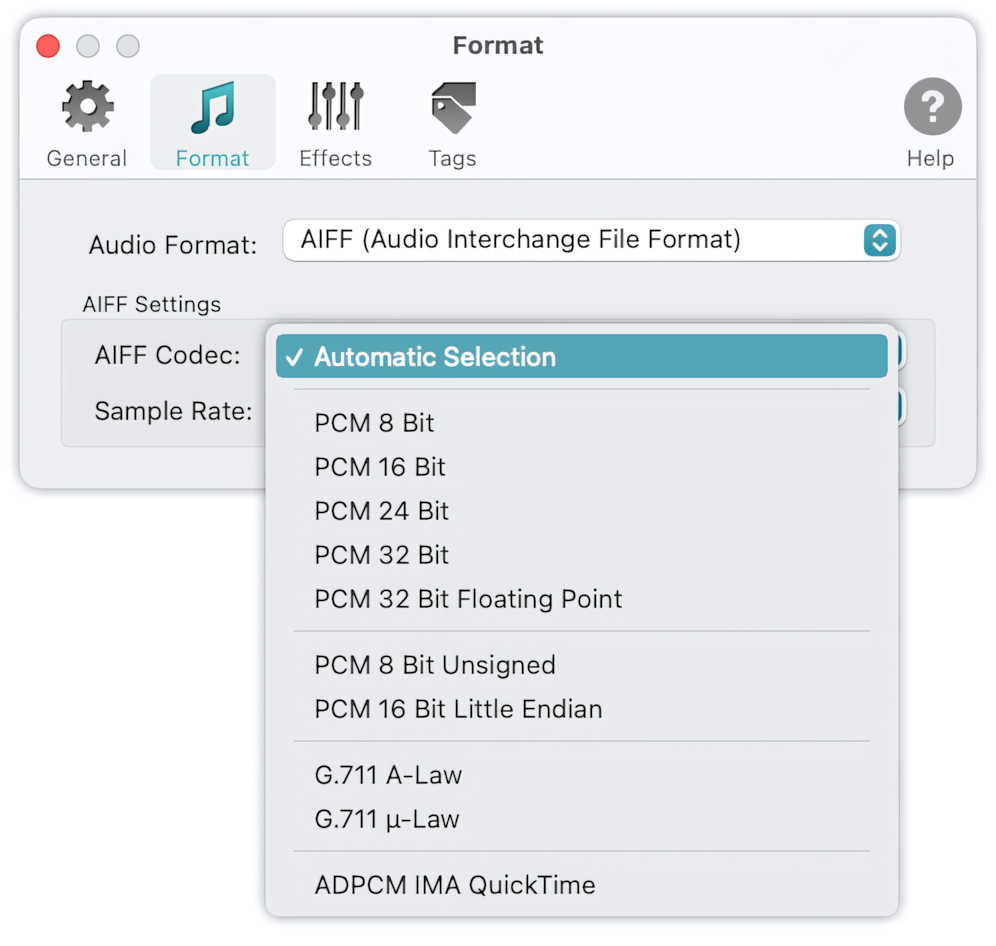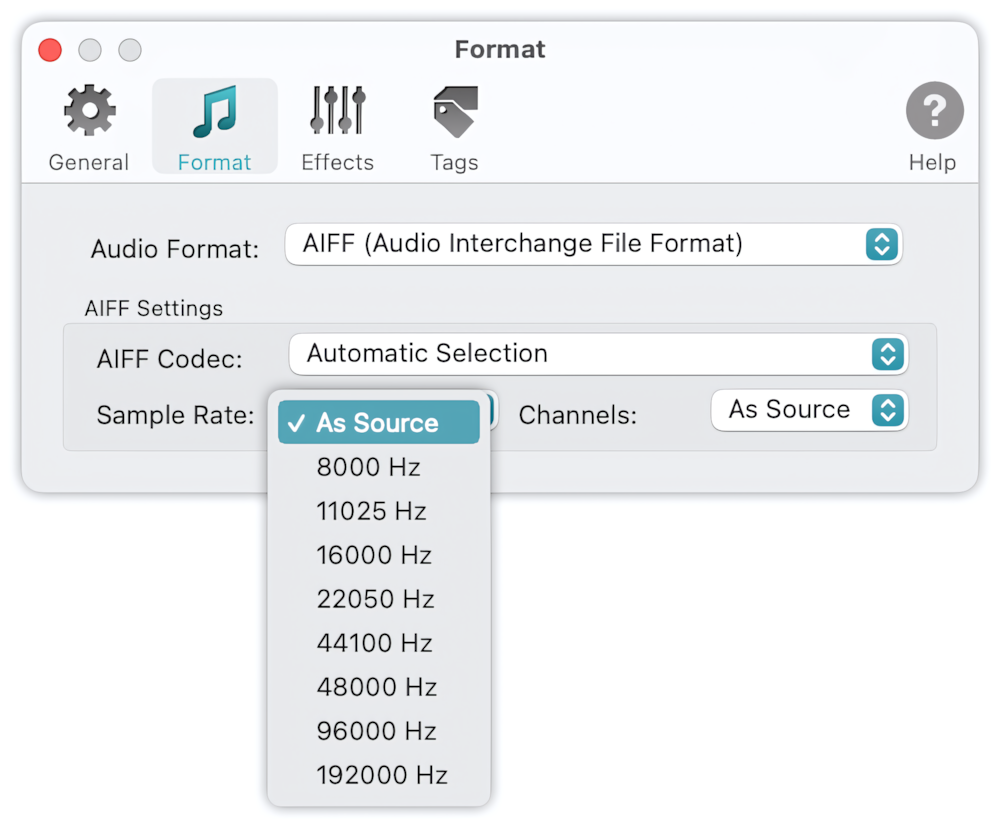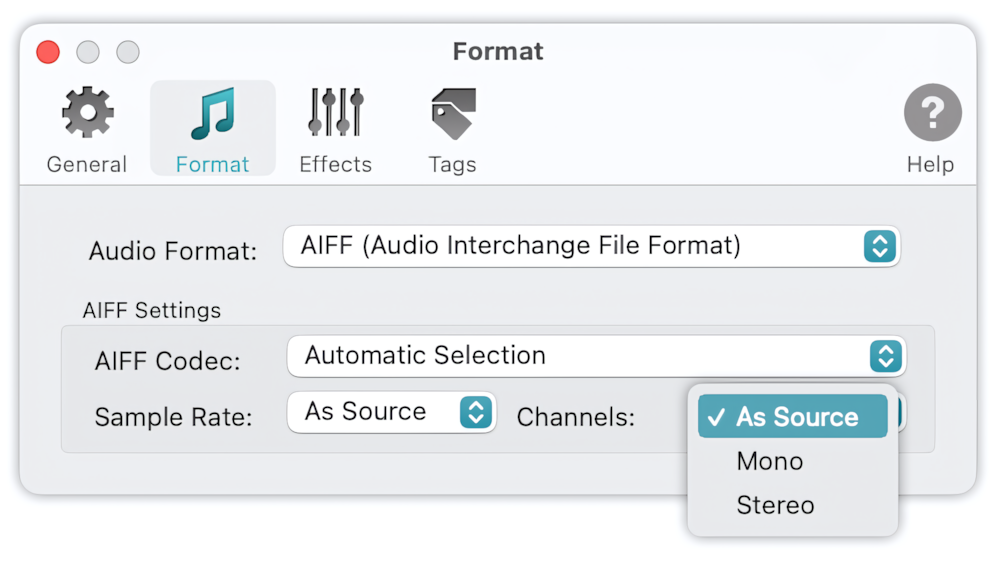What does AIFF stand for?
AIFF stands for Audio Interchange File Format. The AIFF format was developed by Apple in 1988 and is mostly used on Mac computers. Generally, the AIFF format is Apple's equivalent to WAV files.
The most AIFF files contain uncompressed audio data encoded with Pulse Code Modulation (PCM) audio codecs. AIFF files, known as AIFF-C or AIFC, can also store the audio encoded with compression audio codecs.
The AIFF files with uncompressed audio are taking more space than MP3, MP4, or FLAC files. Sending and downloading such AIFF files also takes much more time and space. Therefore, in such cases, the AIFF files are not as popular as their smaller, more portable counterparts.
The standard file extension for AIFF format, accepted by audio applications, is .aif, .aiff, or .aifc.
The AIFF Format and AIFF Chunks
The data in AIFF files are stored in chunks that contain a four-character tag, a chunk ID, and the number of bytes. Such an approach allows extending the AIFF Format and keeping besides audio, also AIFF metadata.
A chunk can be represented using the C-like language in the following manner:
struct AIFFChunkHeader {
unsigned int32 chunkID; // chunk ID, e.g. 'COMM', 'SSND', 'MARK'
int32 chunkSize; // chunk size, bytes
char chunkData[];
};
AIFF files may contain chunks of following types:
- Common Chunk (required) - describes parameters of the audio.
- Sound Data Chunk (required) - contains the actual audio frames.
- Marker Chunk - contains markers that point to positions in the sound data. Markers can be used for whatever purposes an application desires.
- Instrument Chunk - defines basic parameters that an instrument, such as a sampler, could use to play back the sound data.
- Comment Chunk - is used to store the text comments.
- Name Chunk - contains a 'Name' (optional text metadata).
- Author Chunk - contains one or more author names.
- Copyright Chunk - contains a copyright notice for the sound.
- Annotation Chunk - contains a comment. Use of this chunk is discouraged. The Comments Chunk should be used instead.
- Audio Recording Chunk - contains information related to audio recording devices.
- MIDI Data Chunk - can be used to store MIDI data.
- Application Chunk - can be used for any purposes by applications applications.
- ID3v2 Chunk - contains metadata in ID3v2 format.
The Common Chunk describes the fundamental parameters of the audio, such as SampleRate, Channels, Bit Depth, and can be represented with the following way:
struct AIFFChunkHeaderCommon {
unsigned int32 chunkID; // is always 'COMM'
int32 chunkSize; // chunk size, bytes
signed int16 channels; // contains the number of audio channels for the sound.
unsigned int32 sampleFrames; // contains the number of audio frames in the Sound Data Chunk.
signed int16 sampleSize; // is the number of bits in each sample in audio frame
long double sampleRate; // is the sample rate
// NOTE: these two fields take place in case of AIF-C format only
unsinged int32 codecID; // AIFF codec ID
pstring codecName; // AIFF codec NAME
};
Supported AIFF Codecs
The number of potentially supported AIFF codecs is limited by 4294967295 (2147483647) by the AIFF format (see the codecID field in the structure AIFFChunkHeaderCommon above).
To WAV Converter and To Audio Converter support output AIFF codecs from the list below:
- PCM 8 Bit
- PCM 16 Bit
- PCM 24 Bit
- PCM 32 Bit
- PCM 32 Bit Floating Point
- PCM 8 Bit Unsigned
- PCM 16 Bit Little Endian
- G.711 A-Law
- G.711 μ-Law
- ADPCM IMA QuickTime
Codecs, such as G.711, ADPCM, and GSM 6.10 can provide a good compression and satisfactory quality for the Voice Audio.
Read More: How to setup output AIFF codec. >>
Supported Sample Rates
The Sample Rate can be set to the arbitrary value from 1 to 4294967295 Hz. To WAV Converter and To Audio Converter support Sample Rates from the standard set, as in the picture below.
Read More: how to set up the AIFF Sample Rate. >>
Supported Channels
The AIFF format can potentially support up to 32768 channels. To WAV Converter and To Audio Converter support standard fixed channels - Mono and Stereo, as in the picture below.
Read More: how to set up the AIFF Channels. >>
Supported Metadata
AIFF Format provides a special metadata chunk - a Name, Author, Comment, Annotation, Copyright, and ID3 chunk. Besides them, Extensible Metadata Platform (XMP) data can be stored in the Application chunk.
To WAV Converter and To Audio Converter support ID3v2.4 tags and store them in ID3 Chunk. When encountering tags in source files, the converters can transfer source tags and write them in ID3v2.4 format in resulting AIFF files.
The Tag Editor was designed to modify AIFF metadata and also supports ID3v2.4 tags.
Read More: Preferences / Tags >>
Read More: Metadata Formats supported by the Tag Editor >>





